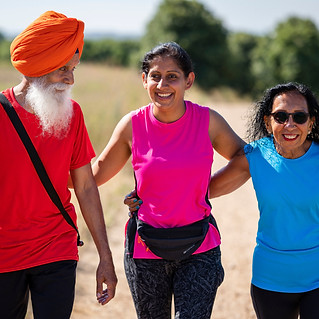
How to talk about loneliness
A simple guide to having conversations about loneliness
Loneliness can feel like a tricky topic to broach. Most commonly, when we think of a lonely person, we imagine someone who is old and sad, when in real life, that is often not the case. We can feel both happy and lonely; we can be young and feel lonely; we can hold down a full-time job and/or have a family and friends and feel lonely. Often we don’t want to say anything for fear of embarrassing ourselves or other people. In a wider context, we can unintentionally stigmatise loneliness even further by the way we talk about it.
So how can we change the language around loneliness?
Avoid negative words
As well as talking about loneliness, it’s important how we talk about it. Loneliness is often described in medicalised terms as an ‘epidemic’ and something we’re at risk of catching. We say that someone is ‘suffering’ from loneliness, or that loneliness is something we ‘admit’ to having. The truth is that there’s nothing wrong or shameful about loneliness. It’s best to use neutral or positive language to describe it instead.
How to destigmatise the language of loneliness:
-
Swap ‘suffering’ for ‘experiencing’
-
Rather than ‘admitting’ to feeling lonely, replace it with ‘telling’ someone.
-
Instead of using the term ‘epidemic’ in blanket terms, try using more relatable and fact-based language such as: ‘Statistics show that lots of us are experiencing loneliness these days.’
-
Try to avoid using terms such as ‘end’ or ‘got rid of’ or ‘tackling loneliness’, as it can make people feel even worse. Instead, use practical and positive terms like ‘helping’ or ‘improving.’
-
Reframe your language. Instead of talking about curing someone of loneliness, say: ‘How can we build up your connections?’
-
Don’t define a person by their loneliness. Avoid describing someone who is feeling lonely as a ‘sad person’ or a ‘social misfit’. People might feel lonely, but first and foremost, they are unique human beings with different interests, talents, and qualities.
Take the soft approach
How to ask someone if they are lonely:
Sometimes, people don’t want to say they’re lonely or want it pointed out to them. Instead of being direct and asking someone if they’re lonely, try saying, ‘Do you think you’d benefit from seeing more people?’ It might open up the conversation to someone talking about being lonely.
If you’re feeling lonely:
If you don’t feel comfortable saying you are lonely, try something like: ‘I feel like I’m not seeing enough people, and I would benefit from more social contact.’ The subtext is there, and the other person will understand. It also helps you feel that you are taking control of the situation and are doing something about it. Don’t feel embarrassed, get practical instead!
Use empowering language
Rather than saying ‘I am lonely’ try saying ‘I feel lonely.’ That way you feel like you have more control over your loneliness and that it’s something you are experiencing right now, rather than it being a permanent state of being.
What to say to a lonely person
"People aren’t responsible for me being lonely"
“People can get very uncomfortable when I say I get lonely,” says Ron, 78, a retired widower. “I think they think that they should be doing something about it, but that’s not the case at all. People can’t help me miss my wife less but a friendly ear helps or just things like having a cup of tea together. It’s the company. Just being able to tell someone how I’m feeling makes me feel like I’m not going mad and loneliness isn’t something to be ashamed of. I don’t feel so alone keeping these feelings inside of me.”
“Just having someone listen really helped”
“It was a real shock to me when I got lonely,” says Ali, 43. “I have lots of friends and family so I didn’t think I was the type of person who got lonely. I felt really embarrassed about it at first because there is this stigma around loneliness. I remember ringing a close friend to tell her how I was feeling and I felt so nervous beforehand. But she just listened without trying to give me loads of advice or telling me that I had nothing to feel lonely about. At the end she said: “I’m really sorry you’ve been feeling this way, is there anything I can do to help?” It was the perfect response: empathetic and practical and no feeling of judgment. It really helped me go on and talk about feeling lonely with other people.”
“I don’t want people feeling sorry for me.”
“I think people don’t ask me how I am because they’re worried I’ll start crying or get upset,” says Elsie, 84, who lives alone. “But you can still have a giggle when you feel lonely. I don’t want people feeling sorry for me. People tend to get very serious when they talk about loneliness like there’s been a death in the family, the only death has been my social life! Or even worse, people don’t talk about it at all. It’s like the big elephant in the room. When people ask me how I am, I might be having one of those days and say that I’m feeling lonely, but the next time they ask me I could be fine. I feel like the more we talk about it, the more it becomes part of everyday conversations and everyone gets a bit more comfy with it.”
How loneliness is covered in the media
Loneliness has been an emerging social issue for many years, with Marmalade Trust and other organisations raising its profile. The World Health Organisation recently declared loneliness as a 'global public health concern'.
With this new impetus, it's crucial for everyone from policy makers and researchers to the media to understand how to report on loneliness. Media coverage is often centred on chronic long-term loneliness and statistics such as loneliness being as bad for us as smoking fifteen cigarettes a day. Loneliness can develop into more serious health issues if left unaddressed, but many people experience temporary or circumstantial loneliness, both of which are extremely normal and fixable.
If coverage is disproportionately focused on the more extreme end of the spectrum, it can unintentionally make people feel worried or embarrassed about feeling lonely and potentially stop them from talking about it or taking action. We would love to see a wider representation of loneliness in the media and more of the human stories behind the statistics.
Marmalade Trust's media guidelines for reporting loneliness
-
Avoid using negative headlines and stigmatizing language such as ‘suffering’, ‘admitting’, ‘tackling’ and ‘epidemic.’
-
Have a wider representation of loneliness stories and positive outcomes
-
Normalise the language around loneliness and advocate it as a natural human emotion
-
Avoid linking loneliness to mental health issues.
.png)



.jpg)